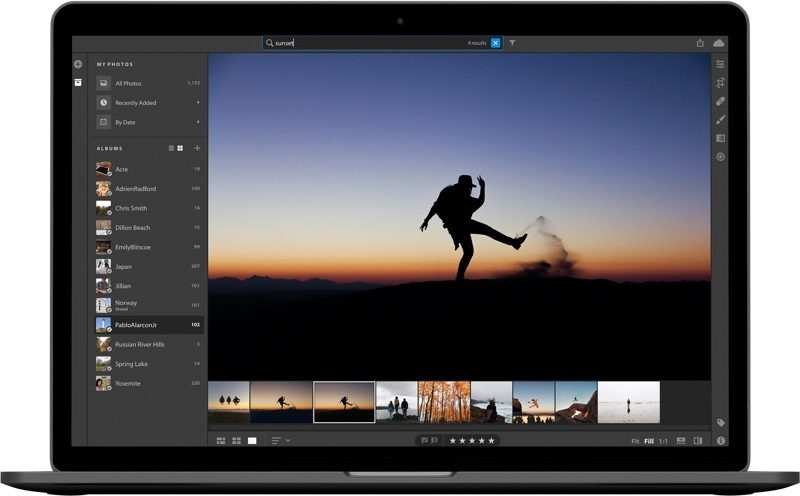Adobe on Wednesday revealed major changes to Lightroom CC, its professional workflow tool for photographers, spinning it off into separate cloud-based and "Classic" versions.
The cloud-oriented software is adopting the Lightroom CC name, as well as earlier features, but saves all of its content in up to 1 terabyte of online storage. It can be accessed via Mac, iOS, or the Web, and syncs edits across devices. Adobe's Sensei machine learning detects people and objects in order to simplify keyword searches.
The software also includes support for Adobe Portfolio sites, creating Web galleries, and sharing to social networks.
Other changes include a streamlined interface with improved presets and adjustments, and enhancements to the companion iPhone and iPad apps that support HEIF images, the iOS 11 Files app, drag-and-drop on the iPad, and pausing sync in case bandwidth or data caps pose a problem.
Lightroom Classic CC will continue to focus on the desktop environment, and is gaining some upgrades of its own including a better Embedded Preview workflow, and new editing functions, among them a Color Range and Luminance Masking feature.
Lightroom CC will cost $19.99 per month as part of a subscription including Photoshop CC and a terabyte of storage. People subscribed to Adobe's existing Photography package will be able to pay $14.99, but only for the first year.
Customers who don't need Photoshop can get a cheaper version of the bundle for $9.99. A mobile-only plan is $4.99, but also limited to 100 gigabytes of storage.
Lightroom Classic is available as part of the Creative Cloud Photography plan, which costs $9.99 per month.
 Roger Fingas
Roger Fingas








 Wesley Hilliard
Wesley Hilliard
 Malcolm Owen
Malcolm Owen
 Amber Neely
Amber Neely
 Christine McKee
Christine McKee
 Andrew Orr
Andrew Orr

 Mike Wuerthele and Malcolm Owen
Mike Wuerthele and Malcolm Owen










32 Comments
At first glance, this seems like a very confusing decision. Without learning more, I can't figure out what benefit there would be to having a standalone piece of software that syncs, instead of folding new mobile sync features into the existing version. Renaming the existing Lightroom as "classic" seems like an odd naming choice, too, because it makes it sound like it's the "old" way of doing things. The "new" Lightroom sounds more like a Lightroom "Elements" sort of program geared toward consumers. It doesn't seem like photographers with huge libraries would want to pay to have all their data stored on Adobe's servers.
If you have an existing Photography package, you don't have to pay more for Lightroom CC unless you want the 1TB of storage. If you don't pay more, you get 20GB of storage.
What does this mean for the non cloud based version of Lightroom?
Is that stand alone version still being supported?